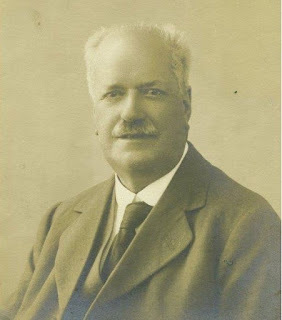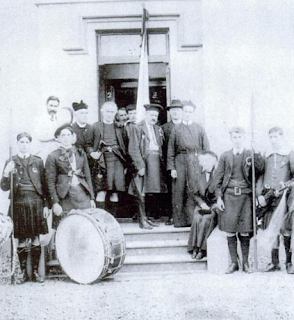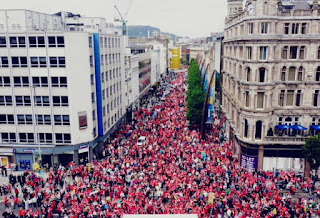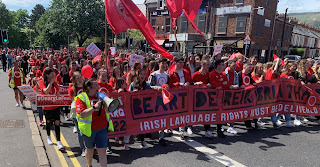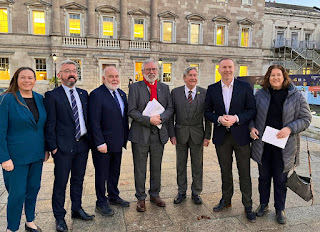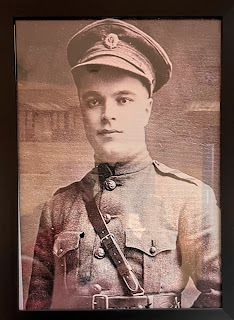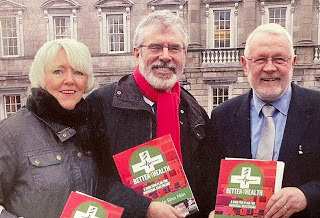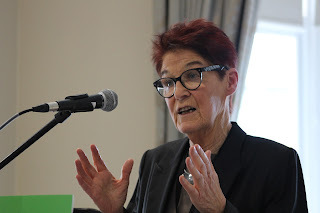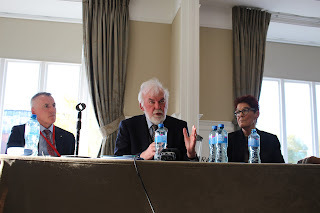Gerry Adams's Blog, page 14
January 22, 2023
BE PREPARED FOR MORE STUPIDITIES: THE MOST HOSPITABLE HOUSE IN IRELAND
BE PREPARED FOR MORE STUPIDITIES
I considered ignoring the British Government’s exclusion of the Sinn Féin President from the recent talks. Then I thought why should I? Stupidity like this needs highlighted. For me it is proof, once again, of what democrats here are up against.
This column could analyse the statements from the current British Secretary of State and the Foreign Minister - With – The – Wonderfully – Inaccurate - Surname. But I will let you do that yourselves if that is your want. Suffice to say that every statement was even stupider than the one which preceded it.
So, I don’t intend to take us through all the he said, she said bits of this most recent debacle except to say that Mary Lou has spelt out the democratic position in her usual articulate way and Leo Varadkar sounded as weak as water with his; ‘I hope this is a one-off and that it doesn’t represent a change of policy’.
Ach Taoiseach. Surely you can do better than that!
This is exactly what you should not be saying. Hope shouldn’t come into it. The fact is the British Government dictating who should represent a political party - any political party - means there is no hope of inclusive talks. The Taoiseach needs to make that clear to the British PM.
So what does this recent stupidity mean? It means that this is the mindset of this British Government. It decided who could attend talks. Because it thinks it can. Proof again that it is against the Good Friday Agreement. That it has no real investment in it. And it is evidence that the Tories have no notion of delivering on their obligations under the Agreement in a positive and good faith manner. That is the reality which all democrats have to face up to.
That means An Taoiseach and Tánaiste, our friends in the USA and the wider international community. And the EU.
Of course, this British Government can and will be moved to honour its obligations. That is the real politick. But as we have just seen it will do this awkwardly and in a minimalist way.
I am rarely really surprised by British stupidity towards Ireland. Even a benign British Government has its lapses. The English establishment doesn’t understand Ireland. How could it? I don’t understand all the sensitivities of the English condition. But then I’m not trying to rule the English. They quite rightly do that themselves. Unfortunately they also think they should govern us. They have no mandate for this. But because they believe they are superior they don’t have any incentive not to be stupid. They don't need to take us or our democratic rights into account. That's the stupidity of their position and the reason for the exclusion of Mary Lou.
But we can end British stupidity by replacing it with self rule by the people who live here. That is our right. At the core of the British current machinations and Unionist contradictions is their refusal to give us that right.
They have already signed up for that principle. But let’s expect no favours from them about its delivery. It’s up to us to create the conditions wherein we exercise our right to self determination. That day is coming. If we proceed as we must, intelligently. So let’s go forward in that knowledge but in a positive and generous way reaching out to others who share our intention of making this a better place for everyone who lives here. But be prepared for more stupidities en route.
FRANCIS JOSEPH BIGGER
For the last few months I have been revisiting many of the oul words that used to be in common usage in times past. My source for many of these was a copy of a book of Montiaghisms written by William Lutton in 1923. The title of the book comes from a district close to Lurgan – the Montiaghs – where Lutton picked up many of the Ulster dialect words. He wasn’t alone in this. Other writers of the period – especially Francis Joseph Bigger - also had an interest in and made use of words that today are no longer used.
The copy I have of Lutton’s book was reprinted in 1976 by the Linen Hall Library but the first edition was published exactly 100 years ago. It was edited by Francis Joseph Bigger.
Bigger was centrally involved in many of the events that shaped Ireland at the turn of the last century. From a Presbyterian family in Mallusk he was a lawyer, gaeilgeoir, historian, folklorist, archaeologist, naturist, gardener, bee keeper, and conservationist. He was also a close friend of many of those who through the Irish Republican Brotherhood planned and participated in the 1916 Rising and subsequent events.
He was a friend to Bulmer Hobson – who founded Na Fianna Éireann in Belfast with Countess Markievicz – with Pádraig Pearse and other leading republicans of the time. He was especially close to Roger Casement who stayed frequently at Ardrigh – Bigger’s home on the Antrim Road in north Belfast.
Bigger was born on the 17 July 1863 in Little Donegall St which runs from Carrickhill down to Library St and on to Royal Avenue in Belfast. He wrote several books and hundreds of articles on Irish history and archaeology, as well as contributing to local newspapers. When he joined the Gaelic League in the 1890’s he came to know Douglas Hyde and Eoin McNeill.
In the late 19th and early 20th century the enormous impact of the great hunger, the decimation of the Irish language and culture, urban migration from the rural areas to Belfast and Dublin and the economic difficulties facing rural communities were all causing huge problems across the island. Bigger believed that the revival of the Irish language and culture were important in meeting these challenges.
In 1898 he was pivotal in organising the centenary celebrations of the 1798 rebellion. He went on to organise pageants, ceilidhs and féiseanna. Prominent among these was the creation of Féis na nGleann – in the Glens of Antrim. Bigger was a regular visitor to the area and he was very taken by its poetry, song, dance and craft. Along with others in 1904 he helped found the Féis which is still going strong over a century later. Bigger believed that the preservation and promotion of our native language, culture and sport would help encourage our sense of national identity.
Among his many other accomplishments was the founding of the Irish Folk Songs Society, the Ulster Public House Association, the Ulster Literary Theatre and the organising of the Irish Harp Festival in 1903. Bigger sought to identify the graves of Robert Emmet and Henry Joy McCracken and was among those who placed a huge granite boulder above what is believed to be the grave of St. Patrick in Downpatrick. Bigger also assisted many musicians with their careers among them the Uilleann piper Francis McPeake ('Da' McPeake), of the McPeake family.
Bigger’s home was a favourite meeting place for those involved in the cultural revival at the turn of the 19th and 20th centuries. Writers, artists and musicians were regular visitors. According to one historian, Roger Dixon, Ardrigh was known as 'the most hospitable house in Ireland'. The importance of Francis Joseph Bigger is not as appreciate today. I am pleased to have this opportunity to remind readers of this influential Belfast man. I often wonder how he and other progressives from northern protestant stock survived the partition of Ireland and the calamities which followed it. Bigger himself died in 1926
On the steps of Ardrigh c. 1914: Bigger (centre), Roger Casement (back row, left) and what is thought to be members of Na Fianna Éireann
January 15, 2023
A failure of leadership: Don’t Let The Old Man In: More oul words
A failure of leadership
The Irish government’s two year term on the UN Security Council is at an end. Micheál Martin, now Tánaiste and Minister for Foreign Affairs claimed last week that the government had “achieved some real and tangible results." As evidence of this he pointed to the UN role in providing humanitarian aid in Syria and challenging Russia over its invasion of Ukraine. However welcome the Irish government’s role was in addressing these matters the reality is that its time on the Security Council failed to match the ambitious targets it set two years ago.
Its most obvious failure has been in providing leadership against Israel’s apartheid policies toward the Palestinian people. In recent months Israeli actions have resulted in hundreds of Palestinian deaths, especially of children. Last week the new Israeli government, led by Benjamin Netanyahu, announced further measures against Palestinians. This followed the Palestinian Authority’s success in getting the UN to agree to ask the International Court of Justice to draft a legal opinion regarding Israel’s conduct in the Palestinian territories. The new Israeli sanctions include freezing Palestinian construction in much of the West Bank while its forces destroy Palestinian homes. The Israeli government has also cleared for further illegal settler construction in the west Bank.
Almost ten years ago the Oireachtas voted in support of the Irish government officially recognising the state of Palestine and providing official Embassy status to the Palestinian Mission in Dublin. None of this was done. The Irish government has also refused to enact The Occupied Territories Bill which makes it illegal to trade with and give economic support to “illegal settlements in territories deemed occupied under international law” most notably Israeli settlements.
The Dublin government’s foreign policy under Fine Gael and Fianna Fáil has been toturn a blind eye to the increasingly apartheid policies of the Israeli state. The Irish government had an opportunity to provide real leadership during its time on the UN Security Council. To challenge Israel’s apartheid policies. To defend the rights of the Palestinian people. It failed.
Don ’ t Let The Old Man In
I have been at a lot of funerals recently. It seems someone from my circle of friends, comrades, associates or neighbours is dying every week this last wee while. And sometimes more often than that. I console myself by reminding myself that its the age I’m at. People were always dying. That’s part of the circle of life. But now I notice it more because its also part of my circle, my own wee peer group.
When RG and I were exiled for almost a decade in the Dáil in Dublin I lost a lot of my social contact with Belfast. Including news of deaths of people I knew. Finding out afterwards that someone had died used to annoy me greatly. Especially if it was long after their funeral. And if I heard about their demise by accident. I used to hate that. Now I’m out of the capital that’s less of a problem. But it’s being replaced with another problem. Too many funerals. Too often.
Funerals are also where we meet people we haven’t seen in a while. Sometimes it’s the only place we see them. Fra McCann is the worst person to fall into company with at a funeral. He gets me into trouble all the time. He always has a funny tale or two to tell. Usually against himself. So before you know it you are grinning widely or worse still guffawing loudly during what is after all a solemn or sad occasion. Fra is like that. He seems never to let things get on top him.
Others are less effervescent. When some old chums of mine bump into each other these days the discussion usually starts with medical updates, talk of bad backs, sore limbs and worse. That’s for those who can hear each other.
‘Was he sick?’
‘No’
‘Who says?’
‘Sue says’.
‘Sue who?’
‘Sue Watch-you- call her’.
‘Who?’
‘Sue says Tommy’s on the mend’.
‘Tommy who?’
‘Tá mé go maith’.
‘Who said that?’
‘Said what?’
Their focus is on sceal about who is in hospital or just out of hospital or on their way to hospital. It reminds me of conversations I used to hear among older people when I was a youngster.
Some of my pals have become obsessed by these issues. No. I won’t name names but RG has noticed it so that’s proof its true.
Whenever I try to ease the conversation gently to more positive issues there is always someone who wants to remind us of the challenges of living. Especially for 50 year activists. Or for some of us almost 60 yearactivists. Maybe that’s natural also. Part of the old aging process. One of my more geriatric buddies is the devil for it. I have learned not to ask him how he is. Because he will tell in minute detail and at great length exactly how afflicted he is. But there is no harm in him. Thankfully hypochondria isnt contagious.
Me? I’ve learned that age does not come on its own so I’m just glad to be still alive. And delighted that some of my nearest and dearest chairde are pottering along, despite our flaws, and still defiant and delinquent.
Martin Ferris put it well one day.
‘Don't let the old man in’, he told me. ‘That’s Clint Eastwood’s secret’.
Martin is right. So is Clint Eastwood.
Live in the moment. And give thanks for it. Enjoy life. And those we meet with along the way. Including those we don’t like. Or who don’t like us. Put up with their awkward ways. Don’t ever forget they put up with us. And our awkward ways. Live in the nowness.
And remember don’t let the old man in. Or the old woman.
MORE OUL WORDS
My friend Emma McArdle sent me some oul words to add to our collection. Emma is from South Armagh.
Whist - Be quiet
Howl your whist - a command - say nothing.
Quit the craic - stop telling me this shocking story
Don't hang me - don't give me away, don't tell on me
Give the deadner - to shock
Hedges and Ditches - Benson and Hedges cigarettes
Bullifance - very drunk
Banjaxed - wrecked / exhaused.
Banty - not moving well, a banty wheel, leg
Bantyho - a very bad skyward kick in Gaelic football
Lanty - go fast - Give her lanty, drive fast
Wet the Tae - make the tea
suckin diesel - having good luck - 'Now we're suckin diesel'
pennies from heaven - finding the thing you were looking for
Chewing your cud - ruminating
dose - bad sickness / annoying person
Codding - joking
Donkey's - from Donkey's Years meaning a long time
Hames - mess
Dead on - grand/fine/sound
Up to high doh - very excited
On top of your head - to be very busy
Another saying I heard years ago in this area is ‘ Every rooster has its own dunkill.’ Every rooster has its own dung heap. A put down for those full of themselves.
According to Emma the next few words are peculiar to the Crossmaglen area. She says they come from traveller language which is called Gammon or Cant. Incidentally I read somewhere that the form of English spoken in Crossmaglen is similar to that which was used by William Shakespeare.
Cant - backchat - That's enough cant out of you!
Feen - boy
Buer - girl
Golya - child
yawk - steal
munya - great
rulya - crazy (can be good or bad - he was going rulya/We were rulya with drink)
Keen - house - Look at the state of this keen
Rog (sounds like dog) - car
When I'm in the mood, adds Emma, here is a rhyme my father used to say to us, I have no idea where it’s from:
‘When I was a lad and so was me dad, I jumped on to the beanstalk
The beanstalk being so full, I jumped onto the roaring bull
The roaring bull being so fat, I jumped onto the gentleman's hat
The gentleman's hat being so fine, I jumped onto the bottle of wine
The bottle of wine being so clear, I jumped onto the bottle of beer,
The bottle of beer being so thick, I jumped onto the oak stick
The oak stick being so narrow, I jumped onto the wheel of the barrow
The wheel of the barrow began to wheel, I jumped onto the horse's heel
The horse's heel began to crack, I jumped onto the horse's back
The horse's back began to bend, I jumped onto the turkey hen
The turkey hen began to lay, and I got an egg before me.’
January 8, 2023
A rights based society will benefit all of us; More Oul Words; An Dream Dearg
A rights based society will benefit all of us
2022 was an interesting year politically. Particularly around the changing attitudes about the relationship between the different parts of the ‘United Kingdom of Britain and Northern Ireland’.
Methinks 2023 will be just as interesting.
But for all the positive shifts in public opinion on the constitutional future for the people of this island there is still an embedded awfulness about the plight of homeless people, the poor and disadvantaged. This is no accident. A government in Dublin wedded to policies which advantage their friends in high places has made little impression on the crisis in public services, especially the health services and the lack of affordable housing. Partition and the absence of a real national democracy have perpetuated this imbalance.
Thank God for those brave souls who struggle within our public services to mind the sick and elderly who depend on these services. They deserve better. Neo-liberalism is the problem. That is capitalism by another name. Citizens deserve rights. Neo-liberalism and its political supporters are against this. They are against citizens having the right to a home, a genuinely public health service and other fundamentals, including workers rights. To achieve these fundamental entitlements will require a government and a popular movement wedded to these rights. Change is needed. Change is desired by the majority of people. Change is possible. In fact change is already happening.
We need to intensify and popularise these demands so that market forces will no longer determine the shape of society based on how much profit will be garnered for big business and other vested interests. A truly democratic society should be citizen centred and rights based. We need to form alliances and coalitions to bring this about.
Political struggle was always more challenging in the North given the divisions, including the partition of our land. Nowadays the absence of the northern Assembly and other Good Friday Agreement structures and London’s toxic and malign role in our affairs, exacerbates this. But here too change is happening. And attitudes are evolving. This is particularly the case within civic society.
It is difficult to figure out precisely how many of those who have shifted their position during 2022 on the constitutional question have done so because of their desire to have an influence on social and equality issues. However, the contributions by some participants at ‘Ireland’s Future’ events and Sinn Féin’s ‘Commission on The Future of Ireland’ give some insights and causes for hope. So does the growing body of literature and academic studies devoted to examining the potential for a new society in Ireland. This is particularly the case with the small but highly articulate groups of citizens from unionist backgrounds.
The arguments being advanced by them illustrate how and why they have ceased to be unionists and are now, some of them anyway, united Irelanders. Some of them were converted by their desire to live in a rights based society and by their discovery that London rule and the Union do not provide this. They want the right to self determination and the ability for us to properly govern ourselves instead of being governed by a self serving clique in London. The majority of unionists, for various reasons, remain wedded to the connection with London. The rest of us in varying degrees detest this terribly unfair union and all its malign consequences. So the division of opinion is deep. But there is now movement towards democratic options. Not an inch doesn't work anymore as well as it used to.
Everyone now knows that the future will be determined by the people by way of referendum. Those who are against change will not want to engage with this. Or to plan or prepare for this. But they know that the referendum is on its way. So despite their refusal to embrace this, the reality is that we are all now into a new phase and everyone will find themselves increasingly having to respond to this. Saying NO will not work anymore. It may delay change. It will not stop it. Other responses will be required.
So, now is the time for a generous enlightened phase of persuasion led by those who are embracing change. This means reaching out to others who are open to persuasion. Linking social and economic rights and the provision of public services as a necessary part of our new, re-imagined political dispensation will be a crucial part of this process. A progressive inclusive truly democratic rights based society will benefit all of us, across every part of this island.
More Oul Words.
And so back to my wee William Lutton book of Ulster Dialect words. Regular readers will recall that William Lutton collected words and phrases mostly used in the Montiaghs, a district close to Lurgan in County Armagh.
My copy of Montiaghisms was reprinted in 1976 by The Linen Hall Library. It was first published in 1923. It is a wee dictionary of Ulster dialect words and phrases collected by William Lutton and edited by Francis Joseph Biggar. Lutton was born in 1807 and died in 1870.
Here is another sample of his notations for your entertainment and consideration.
Codger= a crafty wee boy.
Cologueing = scheming
Cornaptious= irritable
Daunder= to walk about slowly and idly.
Diddy= a female breast.
Dinge = the impression made by a blow on a malleable surface.
Drouth = thirst.
Duds = worn out clothes
Dunder = a loud noise.
Dullas = edible sea weed.
Dear = a title given to God as in ‘The Dear knows …. The Dear keep us.
Fadge = a thick wheaten cake.
Farl = the fourth part of a cake of bread.
Fiz = a tumult or uproar.
Flannin = flannel.
Foother = to do any work or business in an unskilled manner.
For-bye = besides.
Fornent = opposite
Gaulder= a loud shout
Gillygore= more than enough. Go leor.
Glar = thick adhesive mud found at the bottom of bog drains, ponds, rivers.
Glour = to stare at.
Go = a large amount of anything.
A gorb = a glutton.
Gowl = a howl.
Grew hound = a greyhound.
Gub = mouth.
Gern = to make a wry face, to cry quietly.
Guzzle = to throttle.
Haggard = a stackyard.
Harl = to peel the skin of potatoes without the use of a knife
Hape = a large quantity
Heart scald = anything vexatious.
Herrim Skirrim = a rash boisterous thoughtless person
Hoke = to dig badly.
Huff = to offend.
Hunker = to squat down.
Jaap = to use carelessly.
Jagg = a slight stab of a pin or a thorn.
Kink = a suppressed laugh.
Kitlin = a kitten.
Lammin = a good beating.
A lash = a large quantity.
Leather = to beat severely.
Let on = to divulge a secret.
Loanin = a bye road.
Lock = a small quantity
Luck penny = in a bargain a small amount returned to the purchaser.
Lue warm = tepid.
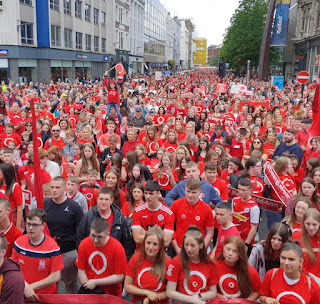
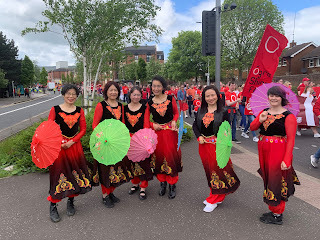
An Dream Dearg
One of the highlights of 2022 was the street campaign for Acht na Gaeilge led by An Dream Dearg. Thank you. Míle buiochas daoibhse. There is a lot more to be done to deliver and advance Irish language rights across this island. But 2022 was a good year for Gaeilgeoirí. The good health and potential revitalisation and growth, against all the odds, of our language is due to the diligence and determination of multitudes of great people over many decades of struggle. We are indebted to them all.
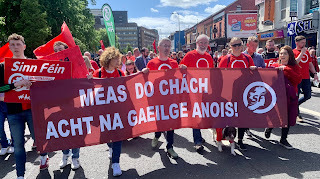 But 2022 should be marked down as the year when we eventually got rid of the last of England’s Penal Laws imposed upon us in 1737. Well done An Dream Dearg and everyone else for bringing colour, vitality, good humour, cheerfulness, success and fun to this achievement. Leanaghaí Ar Aghaigh.
But 2022 should be marked down as the year when we eventually got rid of the last of England’s Penal Laws imposed upon us in 1737. Well done An Dream Dearg and everyone else for bringing colour, vitality, good humour, cheerfulness, success and fun to this achievement. Leanaghaí Ar Aghaigh.
December 31, 2022
Bliain Úr faoi Mhaise Daoibhse: Mountain treasures on our doorstep: The Good Friday Agreement and the Future
A very happy new year to all readers of this column and to Belfast Media supporters. Congratulations again to Andersonstown News on your 50th Anniversary. A great achievement. None of us know what 2023 will bring but we can be sure it will be interesting. May it also be good to you all and to your families. Beirigí bua.
Mountain treasures on our doorstep
When I arrived at Glór Na Móna last week for the launch of The Black Mountain Rewilding Project the place was packed. Tommy Morgan started the evening’s event with a few warm words of thanks and appreciation for the work of Aaron Kelly and his co-workers, particularly film maker Maírtín Keenan.
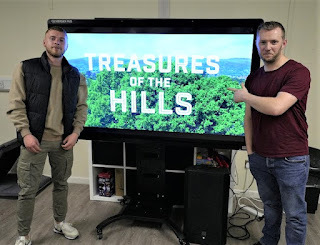 They are all local young people working voluntarily on our wonderful Black Mountain. Like people of my age Aaron spent his childhood playing on the mountain, exploring its wildness and learning about the wildlife which call it home. But Aaron took his mountain rambles to another level. Starting off with litter clean ups he discovered a pine marten, a fairly rare native Irish mammal and that discovery sparked off a series of wildlife surveys of the mountain.
They are all local young people working voluntarily on our wonderful Black Mountain. Like people of my age Aaron spent his childhood playing on the mountain, exploring its wildness and learning about the wildlife which call it home. But Aaron took his mountain rambles to another level. Starting off with litter clean ups he discovered a pine marten, a fairly rare native Irish mammal and that discovery sparked off a series of wildlife surveys of the mountain.
Aaron is knowledgeable and passionate about the unique biodiversity of the Black Mountain. He is working with landowners and farmers to improve and preserve the habitat of foxes, hares, pine martens, lizards, badgers, owls, wild birds including hen harriers and buzzards and moths and butter flies. That work includes planting native trees to re-wood the mountain slopes to provide homes for our mountainy wild life. It’s all there on our doorstep amid flora including wonderful wild flowers like bluebells, mountain streams and wee patches wet lands.
The Treasures of the Hills film was the centre piece of the Glór na Móna event. It took Bayview Media two years to make and it is absolutely a most see documentary. Beautifully shot and produced. I’m tipping it as a potential prize winner for films of its kind. It’s on youtube https://www.youtube.com/watch?v=ZXA6O... and I posted it on my social media platforms. It will also be available for screening in local schools and the community and youth sector. So let’s get behind Aaron and his friends and support them in their work. Saving the planet starts where you are.
For Aaron that means Sliabh Dubh. Aaron can be contacted at BlackMountainwildlifeproject@outlook.com.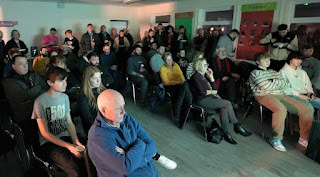
The Good Friday Agreement and the Future
April 2023 will mark the 25th anniversary of the Good Friday Agreement. A month later many will also celebrate the anniversary of the referendum in May 1998 which saw the vast majority of people of the island of Ireland vote in support of the Agreement. I don’t think it is putting it too strongly to describe the Agreement and the referendum as probably the most important political events of our time in Ireland.
With party colleagues in Leinster House on December 15 to address the Good Friday Agreement committee.
The twists and turns from April 10th 1998 to now have been many. Currently the institutions are not in place due to the intransigence of the DUP, the machinations of successive Tory governments and unionist efforts to force the EU and Irish government to scrap the protocol. However, despite these difficulties the success of the Agreement is that there are many people alive today because of it. It brought an end to almost three decades of war. It is seen by many internationally as an example of how deep rooted conflicts can be resolved.
Those who still seek to use violence or threaten the use of violence represent the past. So do the securocrats who manipulate the groups involved. They should end their actions and go away.
Of course, the Good Friday Agreement isn’t a perfect agreement. It was after all a compromise between conflicting political positions. It is also a fact that crucial elements of the Agreement have still not been implemented by the British and Irish governments, including a Bill of Rights for the North and the British government’s refusal to establish an inquiry into the murder of human rights lawyer Pat Finucane.
The reality is that the Tory government has no real investment in the Good Friday Agreement. In fact, its policy is to emasculate the human rights elements of the Agreement. This is evidence in its refusal to fulfil its commitments and obligations to deal with the legacy of the past and the concerns of families bereaved during the conflict.
The Sinn Féin leadership went into the negotiations knowing we would not achieve all of our objectives given our political strength at that time. However, we had our own red line issues. For example; we had already decided to compromise on the need for a single unity referendum by holding two referendums North and South on the same day. Our leadership decided that the policing and justice issues should be dealt with in a separate negotiation – the RUC had to go. In our view a Commission could best deal with this issue.
One of our key objectives was to get rid of the Government of Ireland Act. I am pleased that we succeeded. Then crucially, there is the issue of consent. Previously this was interpreted as referring specifically to the consent of the unionist majority defined in Article 4 of the Sunningdale Agreement as “represented by the Unionist and Alliance delegations.”
The Good Friday Agreement is clear. Constitutional change requires the consent of a majority. This is the democratic position. Of course, the sensible goal for all democrats must be to persuade the largest number of people to vote YES. That is obvious and common sense.
It is also important to understand that the Good Friday Agreement is not a settlement. It never was. It doesn’t pretend to be. It is an agreement to a journey without agreement on the destination. The promise of the Agreement is for a new society in which all citizens are respected; where the failed policies of the past are addressed; and where justice, equality and democracy are the guiding principles.
It also provides for the first time a peaceful democratic pathway to achieving Irish independence and unity. This was crucial and central to the long effort to provide an alternative to armed struggle as a means to advance these legitimate goals.
From a Sinn Féin perspective, the efforts to reach that position involved prolonged engagements with John Hume, back channel communications with successive British governments, with Fianna Fáil led administrations, ongoing outreach to Irish America, and subsequently the White House, as well as attempts to outreach to elements of unionist and loyalist opinion.
To their shame no Irish government has ever produced a strategy to build a new and inclusive Ireland and give effect to Irish unity. The Good Friday Agreement provides the mechanism to achieve this. The absence of Irish government planning is indefensible and incredibly short-sighted. There is no excuse for this.
· We need the full implementation of the Good Friday Agreement
· The setting of a date and planning for the referendum provided for in the Agreement.
· The Irish government to establish a Citizen’s Assembly or series of such Assemblies to discuss the process of constitutional change, as well as the measures needed to build an all-Ireland economy, a truly national health service, education system and much more.
· The Irish government also has a responsibility along with the rest of us to be totally committed to upholding and promoting the rights of our unionist neighbours. The protections in the Good Friday Agreement are their protections also. This is their land, their home place.
All of this makes sense. Very few countries get a chance to begin anew. Ireland, North and South, has that chance. Most leaders would embrace this, welcome it, be excited by it and seize the opportunity. But not successive Irish governments. Political parties which have enjoyed power in the southern state since partition don’t wish to give up that power. That’s why the former Taoiseach Micheál Martin refused to establish a Citizen’s Assembly.
Irish Unity will profoundly transform the political landscape. At the core of the progress we have already made is dialogue. Dialogue - talking and listening to each other - is the key to resolving conflict. Dialogue is key to building an inclusive society. Yes, there will be many challenges but there will also be many opportunities. I look forward to continuing the process of change in 2023.
Nollaigh Shona Daoibh: A night before Christmas
241222
Nollaigh Shona Daoibh.
Beannachtaí daoibhse go leir. Have a great Christmas dear readers. Thanks and benedictions also to the Belfast Media Group team. Christmas can be a sad and stressful time for some people. Be mindful of them my friends. Reach out to neighbours and others who may not be as lucky as we are.
I’m strongly against the commercialism of Christmas. I love the Christmas story and the story of Joseph and Mary and of Jesus’ birth in a stable. The simpleness of it all and the way children relate to Dadaí Na Nollaig appeals to me. So let’s celebrate our humanity, raise a glass to absent friends and give thanks to all who enhance and brighten our lives.
A NIGHT BEFORE CHRISTMAS.
Earlier last week I was on my way to Craigavon for a book signing event. The cold weather had conspired to create a thick fog. As we drove along the M1 we passed what remains of Long Kesh prison and I was reminded of another December, another fog and life in the internment cages.
I have undoubtedly told this story before but good stories always bear telling more than once and it is Christmas. So put up with me.
It was December 1973. Republican prisoners were always scheming around ways to escape. Some would go under the wire; others tried over or through the wire, and others still tried going through the gate, usually in disguise as a visitor. Although in the Great Escape they ran through the front gate pursued by Prison Officers. On that famous occasion 19 out of the 38 escapees made it to freedom.
Escape tunnels were dug, but these suited perimeter cages better. Because of the time required, the problems involved in getting rid of the soil, the closeness of the water table to the surface and the real difficulties encountered in the actual tunnelling, many tunnels were discovered. Still, persistence sometimes paid off.
The camp authorities countered efforts by increased raids and surveillance, and wannabe escapees were badly treated. If captured during an escape, we were beaten and subjected to spells in the punishment block, followed by charges in the Diplock courts. Hugh Coney was shot dead by the British army during an escape attempt in November 1974. Successful efforts to escape over or through the wire were aided by the fog which frequently enveloped Long Kesh in winter. Some of these escapes were unplanned. It was just a matter of being in the right place at the right time, but it helped, of course, to have wire-cutters or other equipment.
A team of us in Cage 6 – Marshall Mooney, Tommy Toland, Marty O’Rawe and myself, all from the Murph – gathered up all the necessary tools, including camouflaged clothing, bolt cutters and hacksaws. We studied weather reports and spent months sitting up for hours waiting for the fog to fall. It didn’t. After a while we got bored with this standing by and, to pass the time, we used to escape from the hut – as a dummy run – and sneak around the cage. Marshall Mooney became particularly adept at this, but despite his ingenuity it was obvious that we were getting nowhere fast.
Fog or no fog, we decided to make a bid on Christmas Eve of 1973 during the midnight mass. By now we had established the blind spots on the wire, and we had perfected a method of getting to them. Christmas Eve eventually arrived, and when the rest of the inmates were locked up, we four cut our way out of Cage 6, and crept into a gap between the internee and sentenced ends of the Kesh. It was ten o’clock. All around us we could hear the prison camp settling down for the night. It was very bright where we were. We were surrounded by miles of razor wire rolled in long tunnels and with watch-towers overlooking it all.
Progress was slow; we crawled along inch by inch. By midnight a slight fog fell. Security was immediately tightened. We could hear orders being shouted all around us, and extra patrols were put out on the catwalk, which ran within feet of us to our right. Inside Cage 6, to our left, a patrol was put in the cage. Unfortunately, the fog was too light to assist us. The extra patrols meant we couldn’t move. We decided to sit tight until the security was lifted.
‘What’s that over there?’ I heard one screw ask.
‘Only an old football,’ replied his fellow screw. I realised it was Marshall Mooney’s head they had spotted, but fortunately they continued on their patrolling rounds and we continued to sit tight.
However, they returned after a while, and one of them was convinced he could see something other than a football. The game was up. ‘Ho, ho, ho, Merry Christmas to you all!’ shouted Marshall Mooney suddenly as he emerged from the razor wire. Then he moved along the wire, trying to draw attention away from Tommy Toland, Marty O’Rawe and me. Searchlights cut through the darkness and the light fog; sirens sounded. Pandemonium broke out in the camp as shouting screws and soldiers ran around all over the place, guard dogs snarling and barking.
Screws were shouting at Marshall to go to the other side of the wire, but when he produced his wire cutters and started to cut his way through they shouted at him to stop. Still trying to draw attention away from us, he walked on along the wire, but there was just too much light and too much attention focused on us, so I decided to try another ruse in the hope that the other two might still be missed by the screws. I stood up and walked away from them. Marshall, who copped on immediately to what I was at, shouted out ‘Hello!’ as if he were greatly surprised to see me. We rushed into each other’s arms, greeting each other like long-lost pals, ignoring the screws, the dogs and the chaos which surrounded us. But the barking and shouting rose to a new crescendo.
The diversion didn’t work, and the screws threatened to set the dogs on us if we didn’t go back the way we had come. The screws and soldiers were pretty fired up as they bustled us up to the punishment block, and Marshall and I took bad beatings. I was wearing a pair of glasses, which I had tied on, and a very senior official pulled my glasses down and when he realised they weren’t coming off he gouged my face so that the flesh was pulled away in a deep and ugly wound. Meanwhile Tommy Toland had hit on the trick of shouting at Marty O’Rawe in a English accent and marching him up to the punishment cells, all the time shouting insults at him.
This succeeded in confusing the Brits, and so Marty and Tommy escaped being beaten. In the punishment block we were taken one at a time and stripped naked. I was first. As I made my way, draped in a blanket, to a cell Toddler slipped a set of wire cutters to me. I put them under my mattress and when we were returned to Cage 6 days later the wire cutters came with me. Meantime the four of us were locked up in separate cells and the dogs were set loose in the corridor outside. We feared that at any moment soldiers and warders would descend on us, and so we kept our spirits up by shouting jokes back and forth to each other. Marshall and Toddler in particular gave the British soldiers a hard time.
Despite their provocations, or maybe because of them, the night passed without incident, though at one stage a couple of British army officers came to have a look at us. The next day, Christmas Day, a British army doctor was sent in to see me as part of the routine of checking that we were still alive.
‘Can you give me some antiseptic cream for my face?’ I asked him.
‘What’s wrong with your face?’ he replied, looking straight at the ugly wound on the side of my nose and across my cheek.
‘I hope you have a great Christmas’ I told him.
‘Happy Christmas to you too’ he replied with a grunt and away he went.
‘Ho Ho Ho’ big Marshall shouted into me. ‘Nollaig Shona duit chara’
‘Nollaig shona daoibhse.’ I shouted back to him and Marty and Todler.
Then I wrapped myself in my blanket and settled down to be entertained by Toddler and Marshall’s festive and very funny and colourful tirade against the unfortunate British soldiers who guarded us.
December 19, 2022
Joseph McKelvey; MONTIAGHISMS.
Joseph McKelvey
The Sinn Féin building on the Falls Road at the corner of Sevastopol St. is internationally famous for its mural of Bobby Sands. Less well known is the fact that the building is dedicated to the memory of another Irish republican, Joe McKelvey. His framed photograph adorns the wall on the first floor.
Both men were in the 20s. Bobby was 27. Joe was 24. Both died in prison. Bobby died after 55 days on hunger strike in the prison hospital in Long Kesh. He was incarcerated by the British state. Joe was 24. He was one of four IRA volunteers shot to death by a Free State firing squad in the prison yard in Mountjoy prison in 1922. Last week – 8 December – was the centenary of his execution.
Joe McKelvey was born in Stewartstown in county Tyrone but moved to Cyprus Street in the Falls area of west Belfast as a teenager. He was a committed Gael. In 1916 he was a founder member of the O’Donovan Rossa CLG in Beechmount. He also had a keen interest in the Irish language.
Those were heady years. There was a cultural revival; the Irish Volunteers, Na Fianna,The Irish Citizens Army and Cumann na mBan had been established and in 1916 the Easter Rising took place. Two years later in the 1918 election the Irish people overwhelming voted for independence.
Joe McKelvey joined the Irish Republican Army in Belfast and quickly rose through its ranks to become O.C. - Officer Commanding - the 1st Battalion in the City. In 1921 the IRA introduced a new structure involving the creation of divisions and Joe McKelvey, then aged 23, was made O.C. of the Third Northern Division which had responsibility for Belfast, most of County Antrim and part of North Down.
His time as O.C. of the Third Northern Division coincided with the partition of Ireland and the creation of the Northern and Southern states. As Unionism, backed by the Tories in Westminster, moved to consolidate its control of the North sectarian violence was widespread. In July 1920 five thousand Catholics were expelled from the shipyards. According to ‘The Belfast Pogroms 1920-22’ this time was “marked by unprecedented looting and burning of Catholic property.” Over the next two years this pattern was repeated. There were attacks daily.
These were the conditions under which Joe McKelvey organised and lead the IRA in defence of nationalist/republican areas and in pursuit of the Republic proclaimed at Easter 1916. He was a capable, intelligent and courageous leader – strongly anti-sectarian. His leadership qualities were recognised when he was elected at the IRA convention in the Mansion House in March 1922 as assistant chief of staff of the IRA.
In April 1922 the anti-Treat IRA occupied the Four Courts in Dublin. Under pressure from the British government the pro-Treaty forces attacked on 28 June. After three days of shelling by the pro-Treaty side, using artillery pieces provided by the British government, the IRA garrison surrendered. Along with Joe McKelvey other senior IRA figures, including Rory O’Connor, Liam Mellows, Richard Barrett and Ernie O’Malley were captured. They were imprisoned in Mountjoy prison. Joe McKelvey was appointed as O.C. by the prisoners.
In the following months the pro-Treaty government introduced the Public Safety Emergency Powers Bill – called the Murder Bill by republicans - that established military courts and allowed the state to execute anyone found guilty of carrying arms. During this time nine IRA volunteers were executed, including Erskine Childers who had used his yacht to transport weapons for the Rising into Howth in 1914. In total 81 republicans were summarily executed in the seven months between November 1922 and May 1923.
On 6 December the Free State officially came into existence. That same day Sean Hales a Free State TD was shot dead in Dublin. The Free State cabinet determined on an act of reprisal. Four IRA prisoners, Joe McKelvey, Rory O’Connor, Liam Mellows and Richard Barrett were told they were to be moved. They were not initially told why but eventually were given a typed notice which stated:
“You are hereby notified that, being a person taken in arms against the government, you will be executed as a reprisal for the assassination of Brigadier Sean Hales TD . . . and as a solemn warning to those associated with you who are engaged in a conspiracy of assassination against the representatives of the Irish people.”
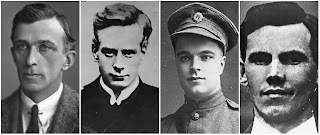 On the morning of 8 December the four were taken to the prison yard. There had been no trial. No legal sentence. There were twenty in the firing squad and they were to target specific individuals but it has been reported that most fired at Rory O’Connor. As a result so many bullets struck him that his coat caught fire. Joe McKelvey and Richard Barrett were still alive after the volley. Joe, who was still conscious Joe was still conscious shouted out “for god sake finish me off.” AFree State Officer shot them as they lay wounded.
On the morning of 8 December the four were taken to the prison yard. There had been no trial. No legal sentence. There were twenty in the firing squad and they were to target specific individuals but it has been reported that most fired at Rory O’Connor. As a result so many bullets struck him that his coat caught fire. Joe McKelvey and Richard Barrett were still alive after the volley. Joe, who was still conscious Joe was still conscious shouted out “for god sake finish me off.” AFree State Officer shot them as they lay wounded.
“The time will inevitably come, if this Free State comes into existence, when you will have a permanent government in the country, and permanent governments in any country have a dislike to being turned out, and they will seek to fight their own corner before anything else. Men will get into positions, men will hold power, and men who get into positions and hold power will desire to remain undisturbed and will not want to be removed, or will not take a step that will mean removal in case of failure.”
His remarks were prophetically accurate.
MONTIAGHISMS.
Here is another wee look at words and phrases which are no longer in use. My last column on these local dialect phrases was very favourably received. I had very little work to do this week because my old pal, Tom Hartley gave me a copy of a lovely wee book - MONTIAGHISMS made up of such words and phrases. The Montiaghs is a rural parish on the shores of LoughNeagh, west of Lurgan and north of Portadown. Montiaghs is pronounced Munchies.
My copy of Montiaghisms was reprinted in 1976 by The Linen Hall Library. It was first published in 1923. It is a wee dictionary of Ulster dialect words and phrases collected by William Lutton and edited by Francis Joseph Biggar. Lutton was born in 1807 and died in 1870. He was a land and road surveyor. He was a diligent collector of dialect phrases and words. As in our own time some of these were no longer in use when Lutton first put together his collection of some nine hundred entries.
This collection was edited by Francis Joseph Biggar. He calculates that twenty five percent of Lutton’s collection are of ‘purely Gaelic origin’.
Biggar is worthy of a little bio all of his own. I will return to this in the near future. Suffice for now to say he was a formidable patron of the Arts, including the Irish language and music. He was a founder member of the Belfast branch of Conradh na Gaeilge in 1895. A lawyer by profession, he was very active in Irish literary, theatre and musical circles. His home, Ardrigh, 737 Antrim Road, was a meeting place for others of similar views including Roger Casement. Here is a small sample of some of the words collected by William Lutton.
Amadthan. A thoughtless person.
Axe. Ask.
At himself as in ‘Not at himself’. Unwell.
Baren. Except. All baren one. All except one.
Blatther. A loud noise.
Boast. Hollow.
Bowl. Bold.
Boxty. A dish made of potatoes, flour or meal.
Bran new. Very new.
Buckey briar. Wild rose.
Cawdey. A crafty wee boy.
Cayley. Ceili. A house visit to exchange news, stories and gossip.
Cheep. Chirp.
Cleek. A slender hook made of wire.
More of this anon. But to finish words I picked up myself the other day.
Dunder Head. A stupid person.
Galoot. A big awkward ignorant person.
Shoneen. A derogatory term to describe a pro English Irish person. From Little John as in John Bull. So a wee John Bull.
Scud. Bad luck. Eg ‘He put a scud on me’ or ‘He scudded me’.
Guddies. Training shoes/trainers
December 11, 2022
A Massacre in Instalments: Making the Case for Irish Unity: Last words
A Massacre in Instalments
As I write this column the number of Palestinians killed this year by Israeli forces and settlers in the occupied West Bank, East Jerusalem and the Gaza strip is 207. By the time it is published in a few days time that number will have increased. Last Friday I watched online video of the last moments of Ammar Mufleh, aged 23, shot dead in Huwara, south of Nablus in the occupied West Bank by an Israeli soldier. He was the tenth Palestinian killed by Israeli forces in 10 days.
Shamefully the mainstream western based international media and many governments chose not to report this or comment on this and other recent events. They have chosen to ignore the daily brutality and excesses of the Israeli apartheid state. Hanan Ashwari, the former Palestinian peace negotiator described the Palestinian deaths this year and the 80,000 that have occurred since 1967 as “a massacre in instalments.”
Last week the United Nations International Day of Solidarity with the Palestinian People took place. It was established in 1978 as an annual event to focus attention on the plight of the five million Palestinian people living under constant fear and duress in the occupied West Bank or under siege in Gaza, the largest open air prison in the world.
The refusal of the governments of the European Union, including the Irish Government, the USA and others to directly challenge the actions of Israel’s military and economic apartheid policies means that that the Israeli government has free rein in imposing its violent regime on the Palestinian people.
In the 45 years since the 1967 War and the illegal occupation of the west Bank, East Jerusalem and the Gaza Strip over 50,000 children have been detained by the Israeli state. Currently 160 children are still being held along with thousands of adults, many interned without trial. Two weeks ago the Save the Children organisation published a report which revealed that 34 children have been killed by Israeli forces and settlers this year. 2022 also witnessed the shocking murder of Palestinian journalist Shireen Abu Akleh and the continued theft of Palestinian land for illegal settlements, summary executions, and the demolition of Palestinian schools and homes.
Currently over 850 Palestinians are being held under administrative detention orders – a more sanitised label for internment without trial. One such internee is Palestinian-French human rights defender Salah Hammouri. According to Amnesty International’s Regional Director for the Middle East and North Africa, Heba Morayef, the Israeli’s plan to deport Salah Hammouri to France. Hammouri has been interned since last March. As an advocate for Palestinian prisoners and rights he has spent nearly a decade in Israeli prisons, often without charge or trial. The decision to revoke Hammouri’s permanent residency status is based on the claim that he is guilty of a “breach of allegiance” to the State of Israel. Hammouri is one of almost 15,000 Palestinians whose residency rights have been stripped from them. It is a form of ethnic cleansing. As Hammouri said himself; “How can a brutally subjugated and colonized population be expected to pledge loyalty to its occupier?”
In the same week the UN Middle East envoy Tor Wennesland warned the UN Security Council, of which the Irish government is a member, that; “After decades of persistent violence, illegal settlement expansion, dormant negotiations and deepening occupation, the conflict is again reaching a boiling point …”
Increasing violence against Palestinians has been fuelled in recent weeks by the successful election results for former extreme right wing Prime Minister Benjamin Netanyahu who appears to be on course to form the next government. Israel’s apartheid regime will only get worse.
Solidarity with the people of Palestine is hugely important at any time however it is even more imperative that solidarity is turned into action. The Irish government has refused to enact The Occupied Territories Bill which makes it illegal to trade with and give economic support to “illegal settlements in territories deemed occupied under international law” most notably Israeli settlements. The Irish government has also decided to ignore Oireachtas motions supporting the right of the Palestinian people to self-determination and for official recognition of Palestine as a state.
I would urge everyone interested in justice for the Palestinian people to support the establishment of a global anti-apartheid campaign. Contact your elected representatives and demand that the Irish government recognise the state of Palestine and use its place on the UN Security Council to challenge Israel’s apartheid policies.
Making the Case for Irish Unity
In 2019 Professor Colin Harvey and Mr Mark Bassett Barrister-at-Law co-authored an independent legal and academic report – The EU and Irish Unity: Planning and Preparing for Constitutional Change in Ireland.” It was part of a series of reports which examined the implications of Brexit.
Last month the two produced a second report. “Making the Case for Irish Unity in the EU” was commissioned by The Left in the European Parliament. It explores the legal mechanisms that are part of the Good Friday Agreement for the island of Ireland to be reunited within the EU. The report also sets out the steps the EU can take to provide for such an eventuality.
A key element of the report is its focus on the need for planning and preparation for Irish Unity which they believe would be “consistent with the right to self-determination, potentially secure more effective protection for human rights and equality, including rights attaching to EU citizenship, guarantee the protection of the functioning of the internal market and provide for a more coherent and democratic system of enforcement of EU law.”
The authors believe that there are referendums on constitutional change coming and that these are likely two choices for the electorate; the North remaining within the British system, outside of the European Union and within a protocol arrangement or a reunified Ireland as a full EU member state.
Colin Harvey and Mark Bassett say it is time that the European institutions looked seriously at this evolving situation. The constitutional future of Ireland will be decided by the people of Ireland. But clearly there is an important role for the European Union in preparing for this. Colin Harvey and Mark Bassett’s report is an invaluable addition to this conversation.
Last Words
There was a very good response to my wee piece on local words which are not heard so often nowadays. Here are a few more to add to your vocabulary.
Sleekit = sly. Underhand.
Fly = see sleekit.
Gunk = shock. As in ‘That scare gave me a quare gunk’
Scally= squinting.
Slegging = joking with. Slegger.
Coul Rife= a person susceptible to coldness.
Gulder = shout. He let a gulder out of him.
Guldering = shouting.
A mhic = son.
A bully = a form of greeting as in ‘A bully Tom. How’s she cutting’. ‘Hullo Tom. How are things?’
Spondoolicks= money.
An oul doll = an old woman.
An oul lad = old man.
Lonan, loney = small road or path.
Paver = paving stone.
Crib or crib stones= kerb.
Cribby = a ball game played against crib stones.
Dunt = a shoulder to shoulder challenge in football or hurling. As in ‘a fair dunt’.
Coupted = fell.
Paralytic = drunk.
Blootered = see paralytic.
Stocious = see blootered.
Crabbid = cranky.
Chanter = singer.
Melarkey = nonsense.
Scoireacht = an evening of song and storytelling….and a wee drink.
A wee dander = a short stroll.
A bottle and a half un = a Guinness and a whiskey.
Curate = a young barman.
Boke = vomit.
Mutt = dog
Muck = wet soil/clay. Dirt.
Mucky = as in ‘a mucky field’ - ‘mucky boots.’
Bogging = dirty.
Sallies = head lice.
Snatter Box = nose.
Thrawn = stubborn.
Thick = Stupid, ignorant, also stubborn. E.G. He is as thick as champ.
Bitter = unforgiving. Intolerent. As in ‘He’s a bitter oul bastard’. Or ‘ He’s very bitter’.
Duncher = a clothcap.
Jalopy = a car.
Are you on you? Are you dressed?
Happed up = warmly clothed as in ‘He was well happed up against the cold.’ Or ‘ You wud need to be well happed up on a coul day like that’.
Teeming = Heavy rain. Also teeming the potatoes. Draining water off boiled potatoes.
November 30, 2022
Marie Ferris and Martin: Adrian Dunbar in Moore St.
281122
A week or so ago on November 18 in Killarney 820 republicans broke bread together in honour of Martin and Marie Ferris. It was a great night. Marie Ferris is one of my heroes. A warrior woman. An activist. A mammy. A mamó. And the wife of Martin Ferris. Martin is one of my heros as well. He is as tough as old boots. As strong as teak. A Kerry Gael from head to toe. But he has the heart of an angel. That’s probably why Marie has put up with him all this time.
They were married in 1978. Marie had returned from Australia. Her story is an amazing one. I am particularly taken by her mother Rita. Better known as ‘Gargy’, from Mayo,she was orphaned before she was five and ended up with the Sisters of Mercy in Westport. She was released aged sixteeen. She became pregnant and a singlemother when she was twenty one. Her son Seán was seized from her when she asked for help from his father with rearing the child. Her son, like Gargy his mother, was given over to the nuns.
Brokenhearted Gargy went to England and then Australia where she married Jimmy a Kerry man who she had met in England. They went on to have four children including Marie. Forty years later their oldest brother Sean and Gargy were reunited and his sibhlings met him for the first time. I remember Marie at that time being delighted at the prospect of her family being together for the first time.
Theirs is a story of Ireland at that time. A story of separation, cruel deprivation, exile and totally unacceptable illtreatment of citizens by a right wing uncaring establishment. But its victims always hoped for better days. Marie’s parents never gave up on Ireland. They knew a better life was possible.
Even though they were in Australia Marie and her siblings were reared in an Irish republican household. That was the idealogy she brought to Ireland with her when she visited her mother who had come home some years earlier. When Marie came to Kerry in 1976 she was a committed repubican. Before long she was also an activist.
Marie lived close to Martin Ferris’ homeplace. These were tough years to be a republican activist in the South. Conflict was raging in the North and those who stood up for the beleaguered nationalists there felt the full weight of aggressive intimidation, harassment and on occasion downright thuggery by elements of the agencies of the State. Censorship was rigidly enforced, the Heavy Gang brutalised those unfortunate enough to fall into its clutches and the prison regimes were particularly punitive. Martin Ferris was one of those singled out for special attention. In 1975 he was in prison.
He graduated to there from a rural childhood near Ardfert long with his brother Brianeen and sister Mary. Their’s was a life of farming and fishing under the tutelege of their father Pattie and mother Agnes. His life in those times reminds me very much of Mark Twain’s Huckleberry Finn. He was always in and out of trouble. Good trouble.
Martin also went on to be a key player for Churchill GAC and later for his county.He remains the most knowledgeable person on Gaelic games that I know. A hurling and football encyclopedia.
In 1970 his father Patti died suddenly. Martin was 18. By now Martin was alert to the injustice of British rule in the north. Before long he became a republican activist.
Terms of imprisonment followed, preceded by brutal interrogations by the Heavy Gang. Marie in the meantime was writing to republican prisoners, including Martin. Apparently he never answered her letters. On St. Patrick’s Day 1975 Martin was part of an attempted escape from Portlaoise Prison in which Volunteer Tom Smith was killed and six other prisoners were wounded. In 1977 Martin and other comrades embarked on a hungerstrike in protest at prison conditions. It was to last 47 days and succeeded in gaining some improvements in the prison regime.
Martin was released later that year and that’s when he and Marie first met; outside Portlaoise Prison where she and Áine Lynch waited to bring him home. Marie and Martin were married the following January.
Their family life was plagued by constant harrassment, by raids and arrests. That’s how the growing family of wee Ferris’s were reared. Martin was arrested again in September 1984 on board The Marita Ann with a cargo of weapons. Marie was pregnant. Their oldest child Eamon was ten. Their three daughters Oonagh, Deirdre and Toireasa were youngsters and baby Cianan was fourteen months old. Martin went back to prison to do hard time but for me the story of that period of their lives, graphically told in JJ Barrett’s Martin Ferris Man of Kerry, is the story of Marie and her children, including new baby Maírtín, journey back and forth for visits to Portlaoise. This went on for ten years.
So, there you have it. Martin went on to be a TD, daughter Toireasa, became the first woman Mayor of Kerry. What a turn around. Republican Kerry prevailed despite everything. The Ferris family, unbowed and unbroken, magnanimous and forward looking and enlarged with 16 grandchildren are vindicated. They, like numerous other republican families, were the backbone of the republican struggle and the cornerstones of Sinn Féin.
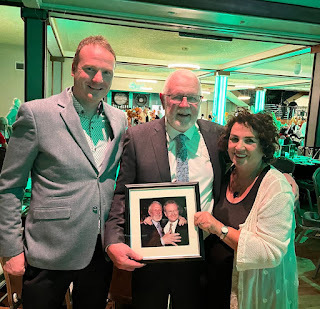 Martin played a huge role in the peace process. He was part of the Sinn Féin team which negotiated with the British Government in Downing Street and other places. He dealt also with the unionist parties and formed a good relationship with the late David Ervine. The two of them enjoyed the odd, or maybe not so odd pint, including in Tralee.
Martin played a huge role in the peace process. He was part of the Sinn Féin team which negotiated with the British Government in Downing Street and other places. He dealt also with the unionist parties and formed a good relationship with the late David Ervine. The two of them enjoyed the odd, or maybe not so odd pint, including in Tralee.
Colette and I are proud that Martin and Marie are our friends. Our struggle is so strong today because of them. Lets all of us go forward together into the new united Ireland. Thank you Marie. Thank you Martin. Tá muid buioch daoibhse.
Adrian Dunbar in Moore St.
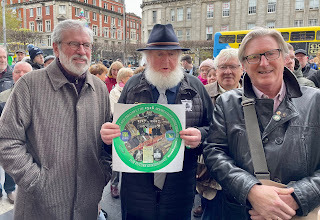 I want to thank Adrian Dunbar and all of those who turned out last Saturday morning for tour of the 1916 Moore St. Battlefield site in Dublin. A special thanks to Honor Ó Brolcháin, grand niece of Joseph Plunkett, and Micheál MacDonncha, Patrick Cooney and Enda Fanning of the Moore St. Preservation Trust, and the many other relatives who took part, including Brendan Mulvihill and Harry Coyle whose grandfathers were killed on the street. Thanks also to Evelyn Campbell who sang ‘Fenian Women Blues’ a reminder of all of those women who participated in the Rising.
I want to thank Adrian Dunbar and all of those who turned out last Saturday morning for tour of the 1916 Moore St. Battlefield site in Dublin. A special thanks to Honor Ó Brolcháin, grand niece of Joseph Plunkett, and Micheál MacDonncha, Patrick Cooney and Enda Fanning of the Moore St. Preservation Trust, and the many other relatives who took part, including Brendan Mulvihill and Harry Coyle whose grandfathers were killed on the street. Thanks also to Evelyn Campbell who sang ‘Fenian Women Blues’ a reminder of all of those women who participated in the Rising.
Proinsias Ó Rathaille, grandson of Michael Joseph O’Rahilly - The O’Rahilly - gave a stirring account of his grandfather’s charge up Moore St., as the GPO was being evacuated, in a desperate effort to clear a British Army barricade and of his wounding and subsequent death.
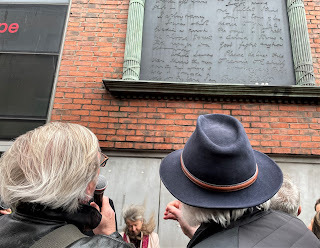 At the end of the tour he and Adrian Dunbar read from the plaque on the wall in O’Rahilly Parade the letter written by the O’Rahilly to his wife as he lay dying.
At the end of the tour he and Adrian Dunbar read from the plaque on the wall in O’Rahilly Parade the letter written by the O’Rahilly to his wife as he lay dying.
“Written after I was shot. Darling Nancy I was shot leading a rush up Moore Street and took refuge in a doorway. While I was there I heard the men pointing out where I was and made a bolt for the laneway I am in now. I got more [than] one bullet I think. Tons and tons of love dearie to you and the boys and to Nell and Anna. It was a good fight anyhow.
Please deliver this to Nannie O' Rahilly, 40 Herbert Park, Dublin. Goodbye Darling.”
A wonderful morning. An emotional reminder of the sacrifice of those who fought in 1916 and a challenge to the Irish government which seems determined to allow a developer to destroy much of this historic Battlefield site.
If you want to preserve Moore Street and the laneways of history go to https://www.facebook.com/MooreStreetTrust/and join the battle to save the 1916 Moore St. Battlefield site.
Words and Hiberno English: Join Adrian Dunbar in Moore St.
21 November 2023
Words.
In Ireland the English which we use is Hiberno English. We use Irish language constructions a lot as well as many Irish words or words based on Irish words.
As part of the colonisation of our island people London tried to destroy our native culture, music, dance and language. They failed and we hibernised the language they forced on us. In Ulster there is also a Scots influence. Different locations have their own local phrases or words. And native place names are special. I love that. Dialects are all part of the colour or fabric of dialogue.
Many of the words or phrases involved are dying out. For example the names of farm implements or other tools which are no longer in use as farming was mechanised in recent times. Similarly with city living and the construction of modern housing and the provision of indoor toilets, bathroom, kitchens and so on. No more ‘Going out to the yard’ for the toilet or ‘the scullery’ to cook the grub.
The advent of television also meant some people converse less. This has been accelerated recently with the wide spread use of social media. Communications are now accessible to almost everyone and this is good but traditional story telling and the use of the spoken word is less prevalent.
I have been thinking of some words which used to be widely used when I was a wee buck. I remember as a young and reluctant scholar efforts being made to standardise the English we used. This included at Saint Mary’s Grammar School. We were being taught to be the lawyers, accountants, civil servants, teachers so BBC standard English was required. I failed to qualify for any of these positions. For its part the BBC frowned on local dialects.
But there were wise people in there too. Especially on the wireless. Mostly men you may notice but that also was a mark of that time. Michael J Murphy. Sam Hanna Bell. Tony McAuley. Jimmy Young, Joe Tomelty, Davy Hammond, Seamus Heaney, Michael Longley kept old words alive. So did the many fine Irish language poets and story tellers.
Before them Alice Milligan, Francis Joseph Biggar,William Lutton, Cathal O Byrne, Florence M Wilson, Brian Friel, William Marshall Robert Bunting. Robert Mac Adhaimh, Cardinal O Fiach and others made their mark.
So here is a sample of words which were widely used when I was younger. I may add more to this list in future columns. And I welcome any suggestions you may have.
Weebuck = young boy. Also gasson. Cub.
Wean = A youngster.
Barge = to give off. Also a boisterous woman.
Beeling = a cut which is discharging pus.
Blirt = a foolish but harmless person.
Scundered = embarrassed.
Pockaill = awkward person.
Amadan = a fool.
A Glyp = see blirt.
Gansaí = sweater. Also GAA sports top.
Togs = sports shorts including swimming togs.
A boil = an abcess.
Bannock = oatloaf.
Bravely = in good health. ‘He’s doing bravely’.
Polis = police.
Brae = hill.
A sprassy = a sixpenny coin.
Oxter = armpit.
Champ = a dish of creamed potatoes and scallions mixed together. Back in the day this was the main meal. Now its a sidedish.
Cleg = a blood sucking fly.
Jiffey = a short period of time.
Geek = looking at, as in ‘taking a wee geek at …’
Hallion = a messer.
Cow’sClap = dung.
Quare = no literal meaning. Maybe derived from ‘queer’ but does not mean gay. Used as ‘Quare and big, quare and soft, etc. Or The Quare Fellow as in Brendan Behans play of the same name.
Thon or Thonder = yon or yonder. As in thon one. Or over thonder.
Forenenist = beside as in forenenist the wall. Or opposite as in ‘forenenist me’.
Teeming = pouring as in teeming with rain.
Gurning = crying or c omplaining.
Ganch = loudmouth.
A dig = a punch.
A fair dig = a fair fight.
A dig in the bake = a punch in the face. A dig in the gub. A punch in the mouth.
Gub = mouth.
Bake = face. Sometimes means a mouth.
Snatters = nose snot.
Slabber = A Loudmouth.
Slabbering = offensive talk.
Eejit = idiot.
Melt. = I dont know the exact meaning but in the build up to a fight between boys the term ‘I’ll knock your melt in’ was often used.
Scalp = a small splinter of wood. As in ‘I’ve a wee scalp in my finger’.
A stewmer = a useless person.
A tube = see a stewmer
Join Adrian Dunbar in Moore St.
If you’re in Dublin this Saturday morning why not come along to the GPO at 11.30am and join us for a unique tour of the Moore St. 1916 Battlefield Site hosted by the well known actor Adrian Dunbar. The tour is being organised by the Moore Street Preservation Trust as part of the campaign to Save Moore Street from the developers’ bulldozers.
The terrace of houses from 10-25 Moore Street were occupied by the GPO garrison after it abandoned the blazing GPO on Friday evening 28 April 1916. Number 16 was the last Headquarters of the leaders of the Rising. Seán MacDiarmada, Pádraig Pearse, Joseph Plunkett, James Connolly and Tom Clarke met and came to the reluctant conclusion that surrender was the only choice open to them to avoid further loss of life. Saturday’s tour will recall those historic events.
As well as Adrian Dunbar and several actors playing the parts of Pádraig Pearse and Nurse Elizabeth O’Farrell, Honor Ó Brolcháin, a relative of Joseph Plunkett, one of the executed leaders, will tell the story of those tumultuous events as they walk the Battlefield site.
The campaign to save Moore Street has been long and difficult. The developers have deep pockets and successive Irish governments have supported their proposals.
However, the Relatives of the Signatories and the relatives of those who fought in the GPO garrison support efforts to create a cultural quarter in these ‘laneways of history’ protecting and preserving for the future this unique part of Dublin. As the Relatives of the Signatories put it in a recent lobby of Dublin City Council; “It is not for one generation to give away or to be left at the mercy of a developer's wrecking ball.”
In recent weeks the campaign has had several notable successes. At the beginning of the month Dublin City Councillors voted unanimously to add key buildings on Moore Street, associated with the 1916 Rising to the Record of Protected Structures. The developer Hammerson claimed that it would be ‘inappropriate and unlawful’ for the Council to do this. The Councillors rejected Hammerson’s claim and voted to give full protection to Numbers 10 and 20/21 Moore Street and partial protection to other important buildings. Numbers 14, 15, 16 and 17 Moore Street are part of the National Monument and are already protected – although the government has left them in a distressing state of decay.
The decision by the Council also exposes the outrageous decision by An Bord Pleanála – the body responsible for planning decisions – to refuse an oral hearing on the many appeals that have been lodged against its decisions to grant permission for the Hammerson plans.
In a further endorsement of the stand taken by the Moore St. Preservation Trust and by the Relatives of those who fought in 1916, a recent meeting of Fingal County Council unanimously called for the creation of a Moore Street Historical Cultural Quarter and backed the Preservation Trust’s alternative plan for the area. The motion recognises Moore Street as the site of the last Headquarters of the Easter Rising and “a site of National historic importance” and “deserving of regeneration as a cultural historical site”.
So the battle to save the 1916 Moore Street Battlefield site continues and is growing in strength. More and more people want to see this area developed as a historic quarter which would be of huge educational, economic and social significance to the people of Dublin Inner city, the capital and the nation, as well as a fitting memorial to the heroism of the men and women of 1916. Perhaps I’ll see you in Dublin on Saturday morning.
In the meantime if you want to save Moore Street write to An Taoiseach at micheal.martin@oireachtas.ie or The Dept of An Taoiseach Merrion Street. BAC 2
November 14, 2022
Time to Extend Presidential Vote to North and Diaspora ; End the Cuban Embargo; A Good Day Out.
141122
Time to Extend Presidential Vote to North and Diaspora
Last week I wrote about the threat posed to our world by climate change. The international climate change conference - COP 27 – which commenced in Egypt on Sunday is viewed by many as the world’s last real opportunity to reverse this threat. This year has been especially dangerous with a mixture of floods, droughts, huge storms and the threat of famine in East Africa.
Thankfully however not all of the news has been bad. The election in Brazil of former President Luiz Inácio Lula da Silva (popularly called Lula) has raised hopes that the huge damage being done to the Amazon rain forest and the threat to the indigenous peoples of that region will now end. Within days of his election it emerged that Brazil, Indonesia and the Democratic Republic of the Congo – which contain 52% of the world’s remaining rainforests – are currently discussing how to create a strategic alliance to coordinate their conversation plans. In his first speech as President-elect Lula committed to zero deforestation. This is a welcome development. But a lot now hinges on the negotiations taking place over the next fortnight at COP27.
One other distinctly Irish aspect of Lula’s election was the long line of Brazilian voters who turned out at Croke Park to exercise their franchise in the Brazilian Presidential election. Under the Brazilian system voting is compulsory for citizens between the ages of 18 and 70. Those between the age of 16 and 18 and over 70 can choose whether to vote or not. Brazilian voters who live outside the state are expected to vote.
Consequently, thousands of Brazilians voted for the Presidential candidate of their choice. This is participatory democracy in action.
Meantime Irish citizens are still waiting for our right to vote in our Presidential elections. In 2013 the Constitutional Convention established by the Irish government overwhelmingly voted to support the extension of the right to vote in Presidential elections to “citizen’s resident outside the State” and to citizens resident in the North.
In 2014 Sean Crowe TD and I introduced a Bill in the Oireachtas to amend the Constitution by referendum to allow the voting age for Presidential elections to be lowered to 16-years-of-age and to introduce votes in Presidential elections for citizens in the North and for the Irish diaspora. The Fine Gael/Labour coalition stalled the legislation and it ran out of time. However the campaign to secure a referendum to extend the franchise in Presidential elections has continued.
Occasionally Irish government Ministers promise to set a date for a referendum on this issue. They know it is popular in the North and among the diaspora but one excuse after another is used to delay setting a date. In December 2020 the Diaspora Minister Colm Brophy promised a referendum would take place in the second half of 2021. It didn’t happen. In April this year he said that the referendum will take place before 2024. This would allow people to vote via postal ballots when the next Presidential election takes place in 2025.
Will it go ahead? The prospect of northern and diaspora voters supporting a candidate not from Fianna Fáil and Fine Gael will undoubtedly loom large in the minds of those parties. It is therefore important that all of us who are for greater democracy, accountability, equality and inclusiveness on the island of Ireland, actively campaign in support of Irish citizens in the north and in the diaspora having the right to vote in future elections for the President of Ireland.
End the Cuban Embargo
The economic and societal impact on the people of Cuba of the economic blockade by the USA is enormous. The blockade, which began in 1960, prevents essential economic and medical resources from reaching the people of that Caribbean island nation. It imposes billions in costs on the Cuban economy each year.
Last week the United Nations General Assembly voted almost unanimously to end the embargo against Cuba. The first time this resolution was put to the United Nations was in 1992. Every year since then the same resolution has been submitted and every year almost every country represented in the Assembly has voted for an end to the embargo. Of the 189 states represented in the Assembly this year 185 supported the resolution. Two states opposed it – the United States and Israel. Brazil – still at the time under the control of outgoing right-wing President Bolsonaro - and Ukraine abstained.
Unfortunately, the general assembly resolutions are not legally binding but the overwhelming nature of the votes does reflect a world-wide rejection of the embargo and solidarity with the Cuban people.
I have been fortunate to visit Cuba several times over the years and to meet Cuban leaders. I have always been warmly welcomed. In 2001, along with other comrades, I unveiled a memorial to mark the twentieth anniversary of the hunger strikes in the H-Blocks and in Armagh Women’s prison. The hunger strike memorial is in Parque Victor Hugo - a beautiful park in central Havana - named after the author of Les Miserables. It reflects the solidarity of the Cuban people for the protesting POWs.
Last week the Cuban Ambassador Mr. Bernardo Guanche attended the Sinn Féin Ard Fheis. It is evidence of the close ties of solidarity that Irish republicans and many Irish people share with the people of Cuba.
Sinn Féin has consistently opposed the embargo. Its economic, cultural and human cost on the people of Cuba has been enormous. The interests of Latin America and especially of Cuba and the USA are best served by an end to the embargo and the creation of a new relationship based on mutual respect and equality.
Ailbhe Smyth
A Good Day Out.
It was good to be able to attend the Sinn Féin Ard Fheis in Dublin last Saturday. The Ard Fheis is the supreme authority in Sinn Féin. It is the open democratic forum where policy is agreed, leaders elected and strategy and direction discussed. Members can attend and visitors but the democratic base of the Ard Fheis is the delegates elected and directed by local cumainn and other party structures to speak and vote on motions which have also been put forward by members.
During the pandemic the Ard Fheis, which is an annual event, could not meet in person. So Saturday was a welcome opportunity to meet with old comrades, and new ones as well. Everyone was in good form. Our leaders set out their views in a series of key note speechs including a stirring Presidential address by Mary Lou to close the Ard Fheis. I was glad to meet some of the Dublin based press correspondents. I haven’t seen any of them since I stood down as TD for Louth so it was good see how much they missed me. They all asked me if I missed Leinster House. Not in the least I told them truthfully. It was an honour to represent the people of Louth and East Meath but I did my time in that institution and it is great that Sinn Féin has so many representatives there these days.
Declan Kearney; Tom Arnold and Ailbhe Smyth
I was also glad to meet visiting delegations, particularly our friends from Palestine and other beleagured parts of the world.
Timothy O Grady was there also to launch a new edition of Curious Journey, first published decades ago by Kenneth Griffith and Timothy and featuring interviews with IRA veterans from the Tan and Civil War period. Availible through An Fuiseog this book is a must read for students of Irish history. Timothy was in fine form.
The fringe meeting on Why The Irish Government Should Set Up A Citizens Assembly to Plan The Future was excellent. Tom Arnold and Ailbhe Smyth, the main speakers delivered informed, thoughtful and very pertinent remarks and Declan Kearney moderated a lively discussion with the capacity audience. Tom Arnold chaired the Constitutional Convention and Ailbhe Smyth was a key player in securing marriage equality and the Repeal of the 8th Amendment. It was great to hear their views. So all in all a good Saturday in the capital. And we won the Rugby game as well.
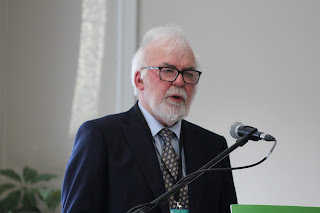
Tom Arnold
Gerry Adams's Blog
- Gerry Adams's profile
- 29 followers


